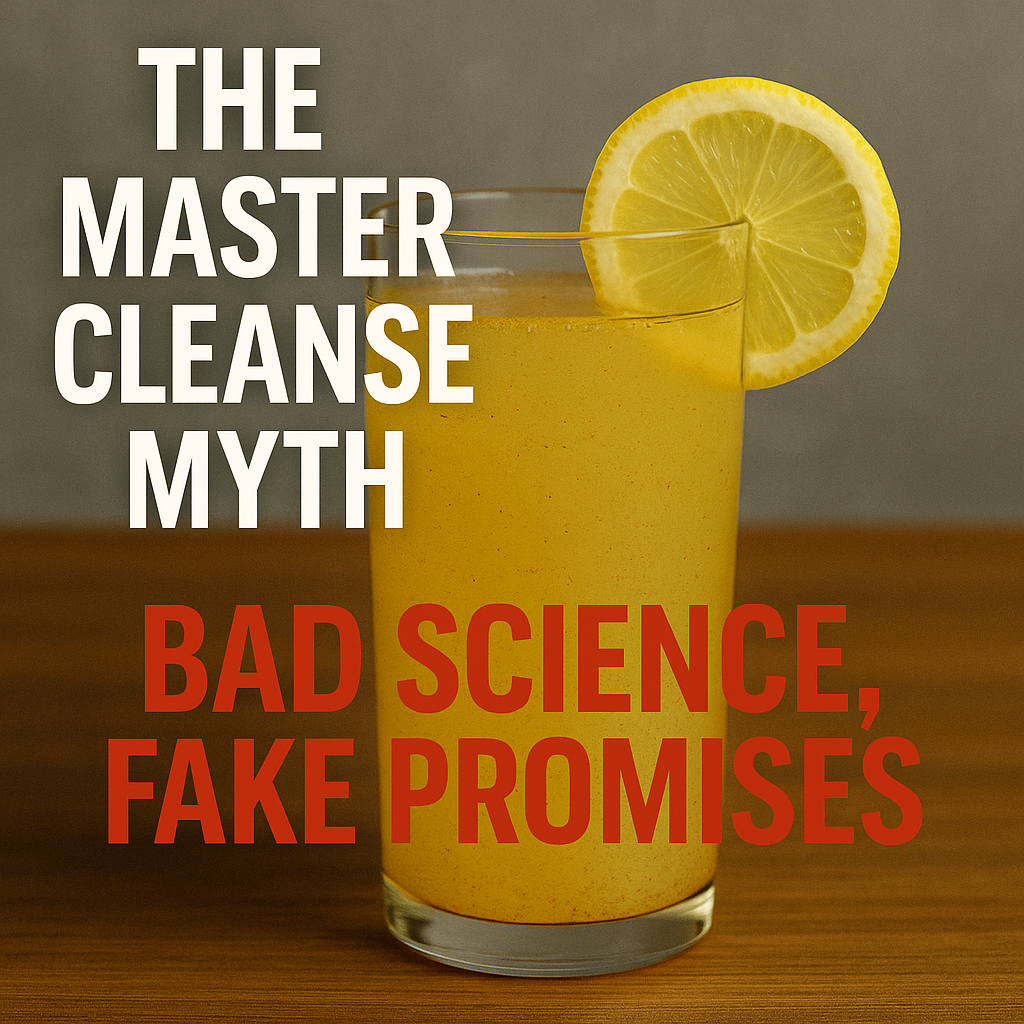
The Master Cleanse: The Spicy Lemon Detox Myth That Just Won’t Die
Share
The History Behind the Master Cleanse
The Master Cleanse, also known as the Lemon Detox Diet, was invented by Stanley A. Burroughs, an American self-proclaimed healer and naturopath, in the 1940s.
Burroughs wasn’t a doctor. He was convicted multiple times for practicing medicine without a license and even faced a second-degree murder charge after one of his patients died under his “treatments,” which included fasting, massage, and colored-light therapy.
In 1976, he published The Master Cleanser, which outlined his famous formula:
-
Water
-
Fresh lemon juice
-
Maple syrup
-
Cayenne pepper
Followers were told to drink this mix 6–12 times per day for 10 days or longer, plus use salt-water flushes and herbal laxative teas. Burroughs claimed it could “eliminate toxins, heal disease, and rejuvenate the body.”
There was never scientific evidence for any of these claims, but celebrity endorsements and social-media fads helped keep the myth alive for decades.
The Truth About “Detox” and Cleansing Diets
Despite the marketing, your body already detoxifies itself.
The liver, kidneys, lungs, skin, and gut constantly filter and excrete metabolic waste. They don’t need help from maple syrup or cayenne. They need adequate protein, hydration, and micronutrients to do their job.
Scientific reviews consistently show no evidence that detox diets or cleanses remove toxins or improve health outcomes:
-
A 2015 review in Journal of Human Nutrition and Dietetics concluded: “There is no compelling evidence to support the use of detox diets for toxin elimination or sustainable weight management.”
-
Harvard Health noted plainly: “There are no data on this particular diet [the Master Cleanse] in the medical literature.”
-
Even the small “lemon detox” study in Korea (2015) only showed short-term weight loss and biomarker changes from severe calorie restriction, not detoxification.
In other words, any “benefit” you feel comes from eating almost nothing, not from mystical cleansing.
But What About the “Science” Behind Lemons?
Supporters often reference research showing that lemon polyphenols, compounds like eriocitrin and hesperidin, have antioxidant or metabolic effects.
And that part is true, in a narrow context.
-
In mice on a high-fat diet, lemon polyphenols improved fat metabolism and reduced liver fat accumulation.
[Miyake et al., J Clin Biochem Nutr. 2006]
-
In cell and rodent studies, these compounds boosted antioxidant capacity and reduced inflammatory signaling.
[Kawaguchi et al., J Nutr Sci Vitaminol. 2008]
The problem? None of this has been replicated in humans using lemon juice.
The doses used in those studies are equivalent to liters of concentrated lemon extract, not a few tablespoons in water.
So yes, lemon compounds have potential in a lab setting. But the Master Cleanse twisted that research into pseudoscience.
The leap from “lemon polyphenols may reduce oxidative stress in mice” to “drink this and flush toxins from your body” is massive and scientifically unsupported.
Why the Weight Loss Isn’t Real
People often report losing 5–10 pounds in a week on the Master Cleanse. Here’s what’s really happening:
-
Glycogen Depletion – When you stop eating carbohydrates, your body burns stored glycogen. Each gram of glycogen binds roughly 3 g of water, so the “fat loss” is really water weight.
-
Muscle Breakdown – With almost no protein intake, your body cannibalizes muscle tissue for energy, lowering your metabolism.
-
Electrolyte Loss – Laxative teas and salt flushes pull water and sodium from the body, risking dehydration and imbalance.
-
Weight Rebound – As soon as normal eating resumes, glycogen stores (and their water) return, often with added fat gain due to slowed metabolism.
That “flat stomach”? It’s dehydration.
That “clean” feeling? It’s hypoglycemia and muscle loss.
The Risks of Cleanses and Fasting Fads
While the Master Cleanse is one of the most extreme examples, nearly all detox or cleanse regimens carry similar risks:
-
Nutrient deficiencies (especially protein, fat-soluble vitamins, and electrolytes)
-
Fatigue and dizziness from low blood sugar
-
Disrupted gut microbiome from laxative abuse
-
Cardiac risks from electrolyte imbalances
-
Rebound overeating and slower metabolism afterward
In other words, the “cleanse” often leaves you worse off than before.
What Actually Works
If you want to “reset” your health, skip the detox gimmicks and focus on what’s proven to support real detoxification and fat loss:
-
Eat whole foods: lean protein, vegetables, fruits, whole grains, and healthy fats.
-
Train consistently: strength and conditioning improve circulation and metabolic function.
-
Stay hydrated: water supports your liver and kidneys far better than lemon syrup.
-
Prioritize sleep: detoxification pathways are most active during deep sleep.
Real health isn’t built on detox beverages, it’s built on consistency, nutrition, and training.
TLDR
The Master Cleanse wasn’t designed by a doctor. It was invented by a man repeatedly convicted for medical fraud.
It doesn’t detoxify you. It starves you.
And while lemon compounds may have some promising science in a lab, that doesn’t translate to drinking cayenne lemonade for ten days.
If you want real, lasting results: feed your body, don’t punish it.
References
-
Klein AV, Kiat H. Detox diets for toxin elimination and weight management: a critical review of the evidence. J Hum Nutr Diet. 2015;28(6):675-686.
-
Harvard Health Publishing. The dubious practice of detox. 2020.
-
Kim MJ et al. Lemon detox diet reduced body fat, insulin resistance, and serum hs-CRP level without hematological changes in overweight Korean women. Nutr Res. 2015;35(9):721-730.
-
Miyake Y et al. Effects of lemon polyphenols on fat metabolism in mice fed a high-fat diet. J Clin Biochem Nutr. 2006;38(2):79-83.
-
Kawaguchi K et al. Lemon polyphenols suppress diet-induced obesity and insulin resistance in mice. J Nutr Sci Vitaminol. 2008;54(6):471-477.
-
British Dietetic Association. Top 5 celebrity diets to avoid. 2019.
